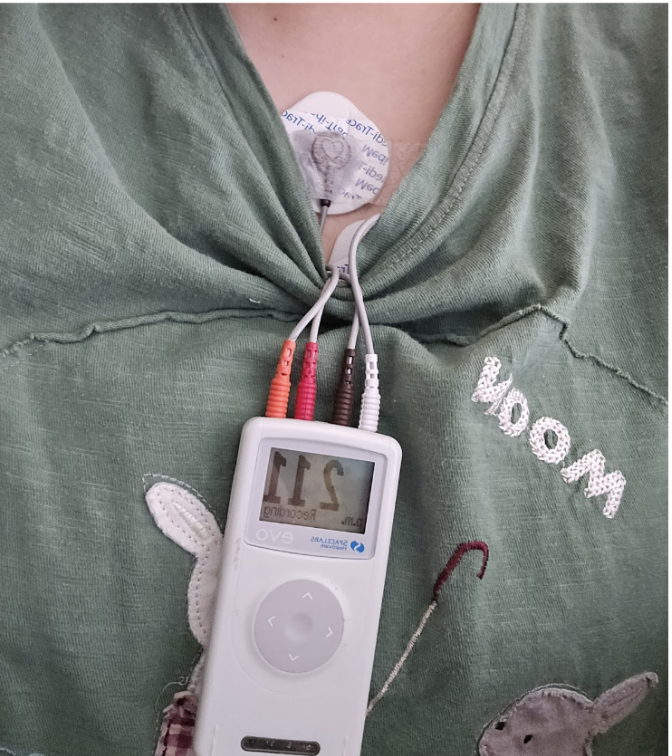
By Hannah Lee
I was scheduled to have my annual 24-hour Holter monitor done over spring break. A Holter monitor is a machine that monitors your heart for 24 hours to see if there are any abnormalities.
I arrived at the Pulse Heart Institute of Tacoma around 1:30 PM and was soon called into a room. The monitor this time was not one of the smaller ones I was used to from my last cardiologist but a four-lead one, which means that there were four sticky patches: two went over my heart and the other pair just above my left abdomen. These patches are connected to wires that are then connected to the little machine that tracks the amount of time remaining and stores the data. I was a little disappointed because it wasn’t like the new monitors I was accustomed to, but I can’t really complain.
I get this monitor annually because of factors related to my genetic condition. I was diagnosed with Mosaic Turner syndrome at four years old. The Turner Syndrome Society of the United States defines Turner syndrome as “a chromosomal condition that describes girls and women with common features, physical traits, and medical conditions caused by the complete or partial absence of the second sex chromosome.”
Turner Syndrome increases your risk of cardiac issues, so a cardiologist was added to my medical team as soon as I was diagnosed. Turner Syndrome also affects your growth, so I took daily growth hormone injections from age 4 to 14. Growth hormone injections can potentially adversely affect your heart, so additional monitoring has always been required. Part of what my cardiologists have recommended is to get annual Holter monitors to catch any potential issues, but it is mostly preventative.
I’ve had to wear these monitors ever since I was a child. It used to be nine different patches connected to wires that would come out from under my shirt. The wires would then be connected to a small machine that was carried in a cross-body purse. The Holter monitors gradually improved so that it was only a sticker over my heart, no leads, and just a flash drive I would send in the mail.
Wearing the monitor is very annoying, to say the least. The nurse who put the monitor on me advised me to never scratch underneath the pads the leads were attached to, which inevitably meant the itching became the one thing that would not cease for the 24 hours I was wearing it.
It’s hard to ignore the itching and not scratch. I know the monitoring is necessary and was explicitly told to not remove the leads, but not getting to scratch an itch is one of life’s greatest annoyances – especially if you’ve been told you can’t. So for those 24 hours of spring break, I was really living it up. But I am glad to report that there was nothing unusual with my readings this year!
Having Turner Syndrome has been a blessing and a curse for me. I can attest to the fact that it has helped me develop my emotional maturity and medical sense. Advocating for myself, as well as making sure I am compliant with my medications and tests, has given me a sense of responsibility. There was a common social media trend where young adults would show that they still bring their parents with them to doctor’s appointments, but I have been going to my own doctor’s appointments without a chaperone since I was 14.
It has also made me grateful for the life I am able to live. Turner Syndrome only affects about 1-2% of conceptions, and only 1% of those survive to term in utero. The fact that I am here, alive, and able to write for The Trail is nothing short of a miracle if I do say so myself.
However, it is also a curse. One of the things that I have to worry about is health insurance. I have been fortunate to have good coverage through my mother, and fortunate to continue to be under that insurance until I am 26. But I worry about how I will be able to pay for my doctor’s visits and medicine once that is not available anymore. Most insurance companies do not want to take on those with pre-existing conditions, so having Turner Syndrome can severely impact my insurance options in the future.
I also worry about getting so sick I won’t be able to bounce back from it. I continue wearing a mask to this day, but as COVID concerns gradually lessen, my anxiety shoots through the roof. When I first caught COVID in my sophomore year, I was worried that I would just get worse. Thankfully, I got better. That might not be the case next time. That’s part of the reason why I have been critical of the University’s lax COVID policies and try to encourage others to wear a mask. It might not be a big deal to you, but it can be to me.
I have been the public health reporter/expert on The Trail since it was re-established, and part of why I carved that niche out for myself is because of my experiences as a medically complex individual. I also wanted to bring some comfort to other medically complex students on campus, to use my words as a way to elevate our struggles and amplify our voices. Some of us do not have the luxury of a ‘normal and healthy’ body, and I would hope that if you have one you will take the time to be thankful for it today.
